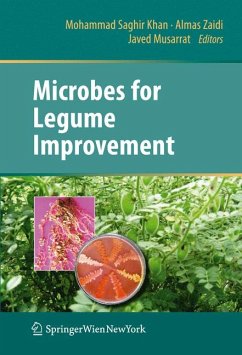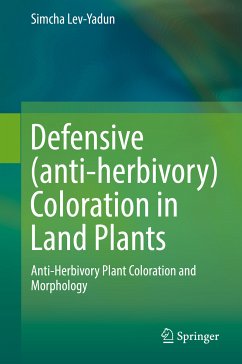
Genes Involved in Plant Defense (eBook, PDF)
Versandkostenfrei!
Sofort per Download lieferbar
40,95 €
inkl. MwSt.
Weitere Ausgaben:

PAYBACK Punkte
20 °P sammeln!
Many fungi and bacteria that associate with plants are potentially harmful and can cause disease, while others enter into mutually beneficial sym bioses. Co-evolution of plants with pathogenic and symbiotic microbes has lead to refined mechanisms of reciprocal recognition, defense and counter defense. Genes in both partners determine and regulate these mechanisms. A detailed understanding of these genes provides basic biological insights as well as a starting point for developing novel methods of crop protection against pathogens. This volume deals with defense-related genes of plants and thei...
Many fungi and bacteria that associate with plants are potentially harmful and can cause disease, while others enter into mutually beneficial sym bioses. Co-evolution of plants with pathogenic and symbiotic microbes has lead to refined mechanisms of reciprocal recognition, defense and counter defense. Genes in both partners determine and regulate these mechanisms. A detailed understanding of these genes provides basic biological insights as well as a starting point for developing novel methods of crop protection against pathogens. This volume deals with defense-related genes of plants and their regulation as well as with the genes of microbes involved in their interaction with plants. Our discussion begins at the level of populations and addresses the complex interaction of plant and microbial genes in multigenic disease resistance and its significance for crop protection as compared to mono genic resistance (Chap. 1). Although monogenic disease resistance may have its problems in the practice of crop protection, it is appealing to the experimentalist: in the so-called gene-for-gene systems, single genes in the plant and in the pathogen specify the compatibility or incompatibility of an interaction providing an ideal experimental system for studying events at the molecular level (Chaps. 2 and 4). Good progress has been made in identifying viral, bacterial, and fungal genes important in virulence and host range (Chaps. 3-6). An important aspect of plant-microbe interactions is the exchange of chemical signals. Microbes can respond to chemical signals of plant origin.
Dieser Download kann aus rechtlichen Gründen nur mit Rechnungsadresse in A, B, BG, CY, CZ, D, DK, EW, E, FIN, F, GR, HR, H, IRL, I, LT, L, LR, M, NL, PL, P, R, S, SLO, SK ausgeliefert werden.












